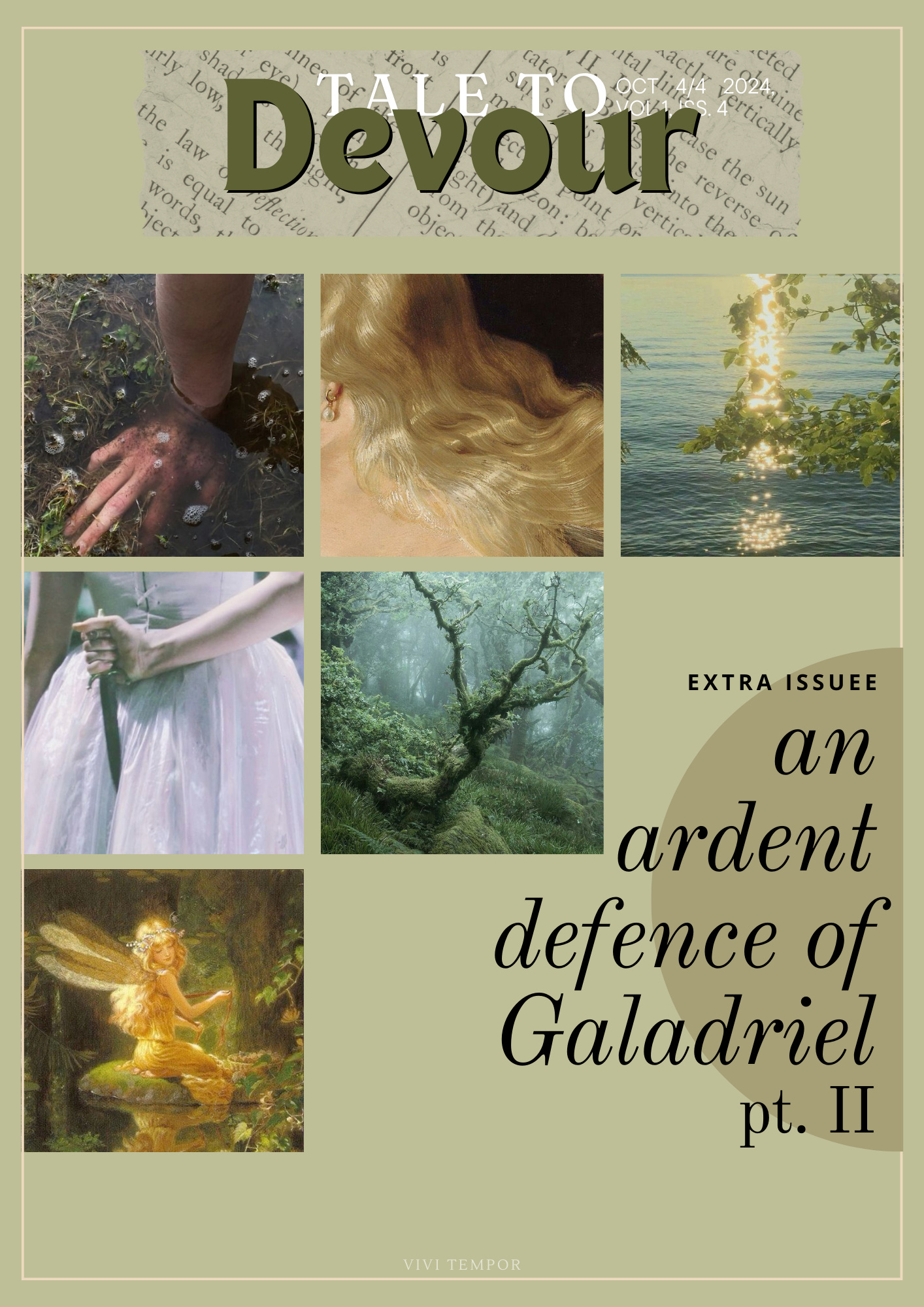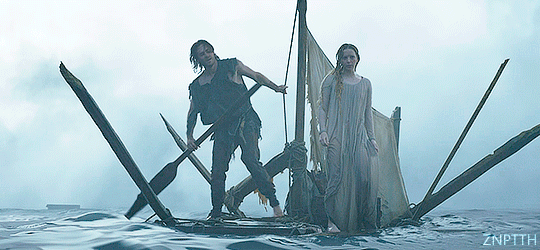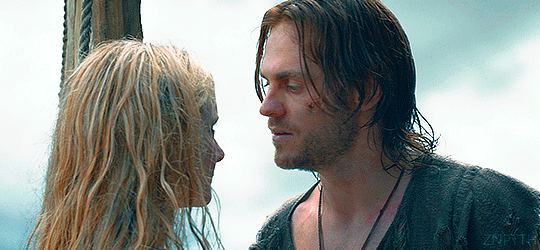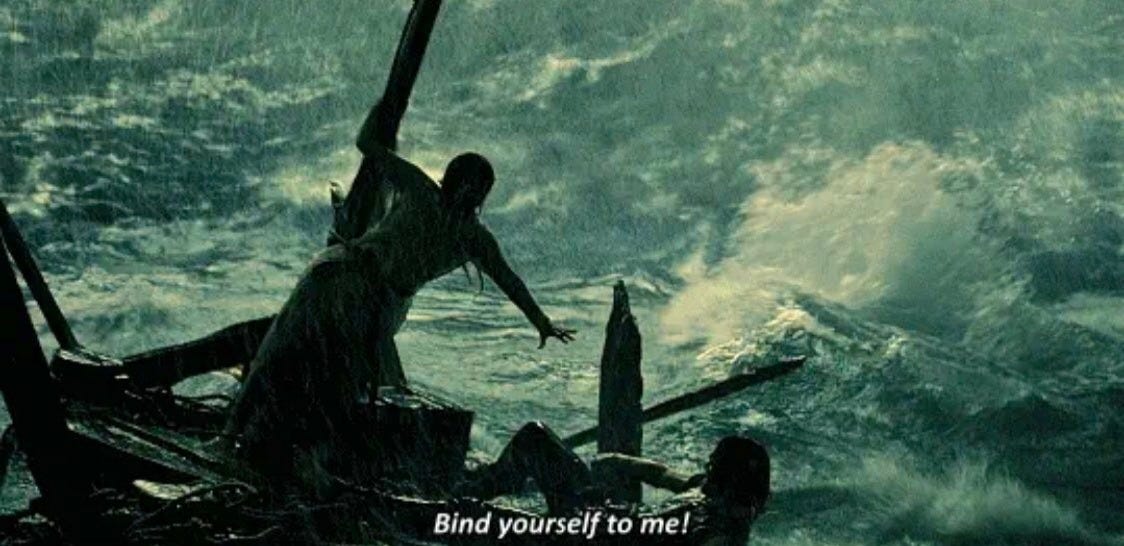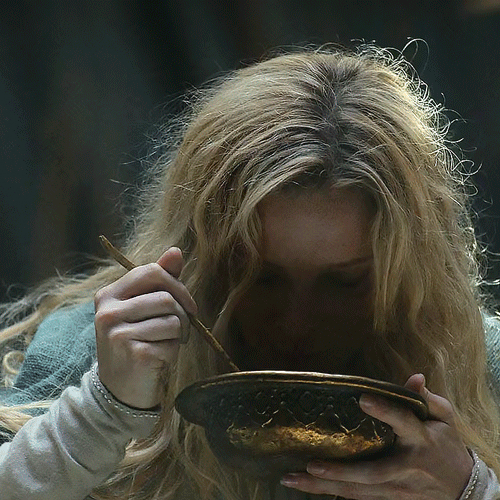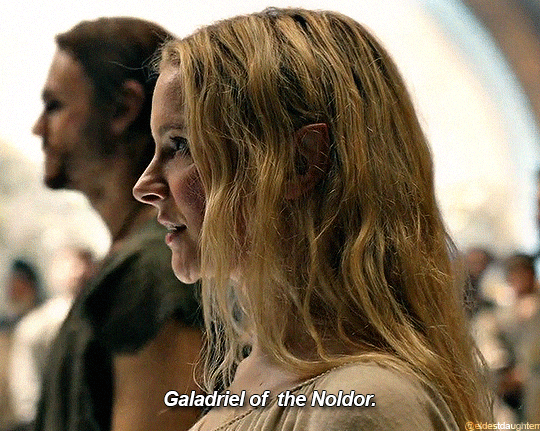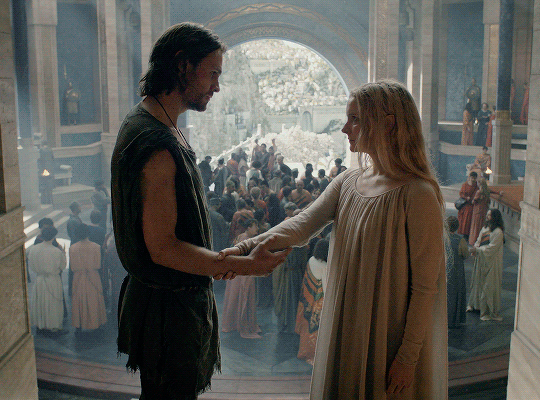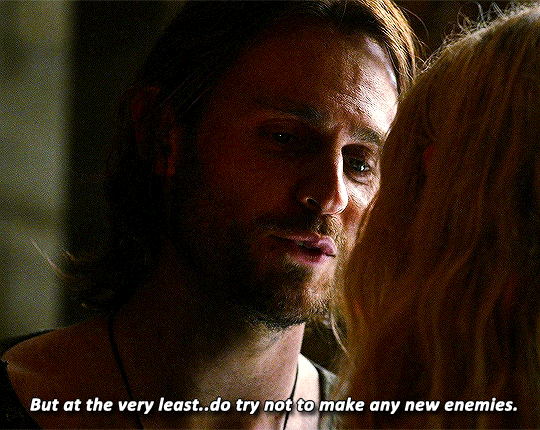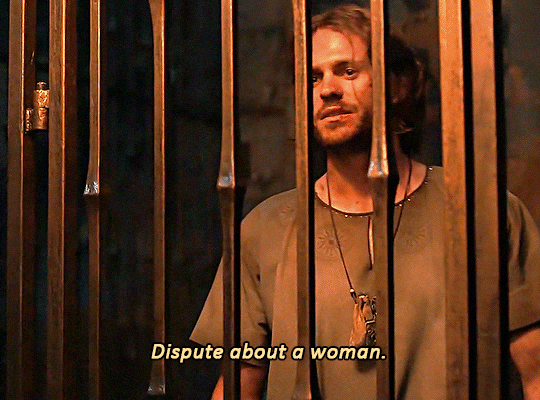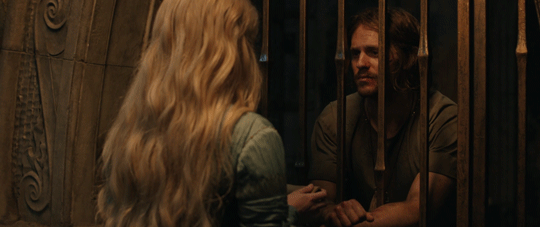Uh-uh, this is awfully late, I am aware. I happened to move countries in the past week and things became just a tiny bit complicated.
Nothing would keep me from my girl though. It seems that all my waking and dreaming thought is disrupted by her; and I cannot keep apart for long, whether it suits me or not. Without further ado:
Episode 2&3: Inn Uncharted Waters
We have established Galadriel as a character in Chapter 1; where we stated that she is a hellishly motivated, unprecedentedly headstrong female protagonist, that also happens to have a great deal of baggage that makes her a bit too motivated.
Up to this point she has shown that particular personality and qualities in environments she’s familiar with (various journeys to hunt Sauron and then the conversations about him back at home, which to her are probably just short intervals in-between hunting the guy) are all something she’s painfully intimate with. Being stranded on deep dark sea without the “I actually happen to be an ancient Elf-woman that is also a great Commander of the Northern Armies” shtick in a country that happens to be frightfully untrusting of the elves is, on the other hand, absolutely not.
Side note: If you’re better-versed in the whole storytelling thing, you might recognise this move. In the bit more advanced versions of the “hero’s journey” formula, the very first step of it entails plucking our character out of their ordinary world, and plunging them into the middle of uncharted waters (no pun intended). When it comes to flawed characters, such us our lovely lady Galadriel, this works on the psychological level as well. Seeing how various vices of our protagonists are maintained in their lives, how their environment makes them grip onto their misbeliefs even tighter, makes us understand how these faults have been maintained for so long. Putting the same characters in new surroundings, that might not necessarily uplift them with all their blemishes, forces them to look inward - sooner or later.
The problem with all episodes forward is that they include our favourite boy Sauro- HALBRAND, obviously, and the sheer plurality of their scenes makes her sole analysis troublesome. My general rule for this is: I am not gonna analyse Sauron UNLESS it is absolutely unavoidable to understand Galadriel. I also wonder how many times I am going to break this rule. Oh well.
Alone at sea:
The first thing we see of Galadriel in episode 2 is her alone, drifting in an endless and bottomless sea. She has leapt into the darkness, quite literally but metaphorically as well. This is a narrative left-over from the last episode - let us forget not what the chosen path means.
After swimming for an untold amount of time - though we can impart that, based on her being visibly exhausted and the sky turning from the deep, evening cobalt to misty gray, she has been swimming at least since the early night to early morning.
Shortly there after she sees a raft, the possibility of a moment of reprieve. And before she makes herself known, she hides her ears.
You heard it well. An exhausted woman who had been swimming non stop for the past several hours takes additional time to hide her identity before seeking rest. And good thing she did, because the moment her ears were revealed, all the shipwrecks turned on her.
It is a little moment, but it sets a precedent for the next couple of episodes.
That is a mere murmur of what will come soon, what will be revealed about Galadriel. She is not only a very proud she-elf, she’s also, for the lack of a better word, exceedingly classist (the correct middle-earthed term would be racist, since men and elves are different “races”, but since that words carries very specific connotation on our earth which I am not trying to reference, I will use the other one instead). Her pride fuels her disregard of people, of men, of other creatures such as orcs. She definitely feels superior to them both because of her race, her age and her experience.
But, what I think is also important, it is not a deep, irredimable hatred.
The thing is, she no longer is a mighty commander with her kin around her. No, she is a lonely she-elf, adrift at sea. That is something we are reminded of when the kind woman who brought her the raft (and even shared whatever water they had left!) doesn’t hesitate to throw her back in the sea at first sign of trouble.
There are things a-brewing in these parts of middle-earth. Tensions. Especially between elves and men.
I wonder what would happen if there’d be a singular elf and man stranded at sea, having to rely on each other to survive.
Oh! Would you look at that!
The Sauron/Halbrand conundrum
Now, obviously, Halbrand enters the story as one of the shipwrecked people, and from that moment Galadriel’s story will be forever intertwined with his. That brings on a certain amount of trouble since, ya know, he is also Sauron, the very guy Galadriel wants to vanquish from this world. At some point in me doing this I would love to analyse Halbrand/Sauron, since he is just such a treasure trove of interesting choices. Think about it: in the first season at least, he is a character that has to work both as Halbrand: for the audience and for Galadriel, and as Sauron: for the sake of characterisation. That means each of his scenes has to work both ways, every word, every twitch, every sound has to be legible as the mysterious man from Southlands as well as the Dark Lord almighty.
Well, this is not that essay.
For the sake of Galadriel’s story, I have to read him as she would in any given moment, though that does involve a certain gullibility from me, and that is not one of my strongest suits, and as such I am heartily accepting criticism.
An elf and a man
The first one-on-one scene with Galadriel and Halbrand is not very groundbreaking, to be quite honest, but it still provides insight:
Halbrand without other options really, invites the she-elf onto the rests of the raft. Galadriel, even if wary of men, is not above accepting help, and she is not as proud as to be self-destructive (it is Halbrand who initially stopped her from getting on board when she went on to the earlier raft - prouder people would not accept help now, when she is the only other companion he has the option to have). She hesitates to go on, but only for a moment - since she doesn’t have any other options either. Galadriel elects to trust him, which is clear when she surrenders her quite famous name after hiding the mere fact she’s and elf, but it is not done wholeheartedly. This is more than a union of convenience, this is a union of survival, for both of them.
And there is the first scene of both of them having extended dialogue. The sea-monster lingers in the darkness, but it is light out, the curious fog is gone. Only the two of them remain.
Obviously they’re adrift at sea for the being of the episode, so whatever costumes they wear have to match the situation, but their clothes leave them exposed: each in a different way. But it also signifies they’re vulnerable, that they need to be.
Pain of despised honour
By now we should know that Galadriel is almost a painfully honourable character. Or rather, she would like to think so.
Her very personal motivation she still thinks of as this virtuous quest for good, which destroying the big left-over bad guy literally is, but it is not the reason for her mission. Yet she pretends that it is. Both to others… but also to herself.
This scene showcases that brilliantly, through an interesting dialogue-type choice.
Not only does it portray her failed sense of honour, but it’s also fantastic in showcasing what I call “interrogative dialogue”.
The status quo for the two characters is strangers. It’s only then reasonable that both of them are keeping themselves separate, however well they can. What is not reasonable per say is one of them trying to do the exact opposite.
As it happens, it is Halbrand who decides to break the silence:
“You needn't keep your distance.”
To which Galadriel replies:
“I am simply wondering what manner of man would so readily abandon his companions to death.”
She still signifies this pride of hers. The honour she clings to.
“The sort that knows how to survive. Why be part of the larger target?”
Which reminds, some people cannot afford that honour. Some people do not have the excuse of legacy. For some people there’s strictly survival.
“You are a target still. I doubt we shall find safety until we make landfall.”
“I suspect finding safety won't be that easy. Leastways not for you. "Separated" from your ship. Really? You're a deserter, aren't you?”
And he’s still the one pursuing the conversation, mind you, one she carefully tried to cut off by making a comment as innocuous as those people make of the weather (in their peculiar situation at least). But the comment he makes at the end cuts her, because it is one that jabs at her righteousness: You're a deserter, aren't you?
“Do I have the look of a deserter?”
“You don't have the look of someone to whom things happen by accident. Which means you were running. Whether toward or from something, I haven't yet decided.”
“Duty demanded I return to Middle-earth. And that is all you need to know.”
She deescaletes, again, refuses to engage. She is decidedly vexed by him. But it’s the next little needle that does the trick:
“Important Elf business, no doubt.”
“What have Elves ever done to you? Do you blame us for your being stranded here?”
And while the first sentence is wounded and argumentatory, the second is seeking understanding. Do you blame us for your being stranded here?
And in that moment Halbrand chooses to say something that fully engages our lady, beyond just her rage:
“The way I see it, it wasn't Elves that chased me from my homeland. It was Orcs.”
I’d invite you to watch the scene again and watch her body language. Through all this discourse she had her back turned to him, only sending quips at him over her shoulder when she needed to, or twisting herself. This time she turns, she comes closer. She engages. And more importantly, she starts to be the party that is, in turn, asking the questions.
“Your home. Where was it?” - question;
“What's it matter? It's ashes now.” - answer;
“I know something of the pain you carry. I grieve for you. For those you lost. Around your neck. Was that the mark of your people's king?”
She acknowledges this is someone who is hurt in a similar manner as she is. But she follows up with another question nonetheless.
In the following couple of lines I ask you to observe the questions and answers, and to whom they belong:
“My people have no king.”
“But if they did, where might that kingdom be found?”
“To what end?”
“What if I told you we might be able to reclaim it?”
“I'm afraid you're short an army.” (this one here is a deferring statement; one that does not answer the stated question, not directly nor indirectly; and aims at delaying the need to answer it. At least in my book).
“Leave the army to me. Why're you dodging the question?”
“Why're you stranded at sea?”
“Because rather than rest in glory, I chose to seek out the very enemy responsible for your suffering.”
The last sentence is a revelatory statement, one in which one of the characters finally breaks and relays some information that was asked about in the middle of the dialogue.
Also, Galadriel is still pushing the narrative of her chivalrousness. What she’s done up to this point is not selfish, no, on the contrary - it is honourable. She’s doing it to prevent others from suffering, not to reach her ends.
This is what I call “interrogative dialogue” where most commonly two characters have a conversation in which they take turns at being the interrogator. Terrific, if done right, and it hardly ever brings the story down. Usually fast paced, with quick, almost stabbing lines, and scarcely any direct answers.
It starts with one of our characters (in here: Halbrand) seeking out answers from the other. Galadriel doesn’t answer, or, when she does, she doesn’t give up the information Halbrand is asking of. Till he divulges and gives just a nugget of detail that makes her the interrogator. Then both of them (by refusing to address the previous questions at all and just continuing their own separate lines of inquiry) take on the role at once.
Normally, it would lead to one of the characters snapping and telling an absolute truth about themselves (which actually does happen between them later on in the series), but here Galadriel upholds her lie. Because rather than rest in glory, I chose to seek out the very enemy responsible for your suffering. It is not the truth, which she has to know, at least deep down.
The whole dialogue also shows their relentless characters. Both of them will not back down.
Aside from being similar, in pain and in their persistence, Halbrand accurately reads Galadriel, both in her insistence about her honour and in the fact she’s assured of its moral nobility:
“Look, Elf. You didn't cause my suffering and you can't fix it. No matter how strong your will. Or your pride. So let it lie.”
“I have pursued this foe since before the first sunrise bloodied the sky. It would take longer than your lifetime even to speak the names of those they have taken from me. So letting it lie is not an option,” Galadriel says.
“At last, a little honesty. If you want to murder Orcs and settle a score, that's your affair. Don't dress it up as heroism.”
In the second part, Halbrand accurately observes she has lied about her motivations beforehand. It is something, for the lack of a better word, he clocked. It’s what she easily disregards by another action, another move, move, move. But then a lone lightning sounds out and it’s light cuts through the darkening sky. They are still but two lone people on an endless sea.
Amidst the Storm
Contrary to the last scene, it is very dialogue-light. Maybe because it’s aim is to communicate without words, rather with their actions.
What is important about the moment the raft is destroyed by the sea monster is how both of them are resigned to handle the situation by their lonesome. The second sea-horror that the storm definitely is, they resolve by working together.
It is worthy of noting just how swiftly and without further considering it Galadriel decides to let Halbrand invade her personal space (vs the “Unhand me, sir!) to, in her mind, save his life. When push comes to shove, if she has anything to do about it, this uncaring prick will not let people just perish in the waters.
She then is plunged into the deep waters as a maiden waiting for rescue, which Halbrand promply gives. (Also notices the pretty pretty dagger she wears, important for later).
Upon rescuing, she lends him a helping hand to help getting on deck, one he receives. And in that moment their fragile alliance has trust imbedded into it. He proved he’s got her back. She’s got his back. This is no longer an alliance of need, it turned into wanting the other person on their side. This is then further corroborated by the episode-closing shot of both of them sleeping, side by side. A very telling sign of trust, the choice of letting go of our very consciousness in the presence of another person, and in their case, basically a stranger.
Island of prejudice
Galadriel wakes up with the horrors of her past still dreaming on her eyelids. She doesn’t remember how she got to a bed, or frankly - just a place with a roof. The suspicious lack of the well known blade by her hip can mean only one thing - her brother’s dagger has been taken.
“She lives,” says Halbrand, emerging from the shadows, with a plate of much-needed food in his hand.
“Our hosts. Saviors or captors?” Asks Galadriel, before taking the first bite.
“It's not poisoned. If that's your concern. Not for humans, anyway.”
She meets his amused smirk with a half-annoyed look, still chewing through the sea-cooked stew.
Now. What does this short interaction can tell us about our characters?
It further shows us the previously established trust, one that’s newly forged with yet no signs of damage. Galadriel knows that they are in this together (Our hosts. Saviors or captors?). There is a hint of certain playfulness in their relationship (Halbrand now feels free to make jokes about her elven nature without much pushback from Galadriel). This scene is building on continuity with their relationship meanwhile propelling the plot forward.
When they emerge on the ship the Chekov’s gun is established: the previously missing dagger is seen on the Capitan’s belt. As for now, she cannot do anything about it, but it is a setup for later.
Then, as they reach Númenor, there is yet another instance of the elf-man relations and what Galadriel specifically thinks of them, and what other men think of Galadriel. Both because she’s an elf, and later on because she’s, ya know, “The Great Commander of the Northern Armies”, yada yada.
When Galadriel explains the country to Halbrand (There’s only one place it can be. The Land of the Star. The westernmost of all realms. The Island Kingdom of Númenor), she is not relieved to have found landfall, mayhap because she is aware of the current state of it, and most importantly, its politics.
It is painted with a heavy brush that she thinks Númenorian men superior to those of other lands. She has a certain distain for people like Halbrand: even if maybe not Halbrand himself:
(”Since when did Men like me build kingdoms such as this?”
“These Men are not like you. In the Great War, your ancestors stood with Morgoth. These Men stood with the Elves.”)
but definitely “his kind”. They are not to be judged by the quality of character, rather their ancestors and their loyalties. It is probably the way of thinking of many a great Elf.
While walking through the streets of the city, she makes comments about the past alliance between men of Númenor and Elves to Halbrand, and her cadence suggest she’s wistful of these times, as opposed to now, where these men not only stand on their own but also detest Elves:
“As a reward, the Valar granted them this island, which has changed much since then.”
“Do I detect a note of envy?”
“Not envy. Sorrow. Once, Elves came and went freely from these shores. Our people were as kin. Sharing gifts, knowledge.
“What happened?”
“Númenor began to turn away our ships. In time, they broke off all contact.“
It is also clear that her fears are not unfounded, as Elendil later says:
“Keep moving. You would not want to be lost here without an escort.”
What is worthy of note is the numerous untrusting glances thrown in Galadriel’s way, all throughout the walk. And with that, the way our fair Lady keeps mapping out the streets in her mind’s eye. Constantly on the lookout, constantly begging for action.
Battle amidst the Men
I think a lot of people are misunderstanding this scene. Yes, it would be much easier if the queen just shipped them off to middle earth, but the point is in how Galadriel demanded it. An Elf cannot command a queen of Númenor, especially Númenor, about anything - and in the presence of various proud Númenorians no less.
“It's been generations since a ship of Númenor was permitted to make such a journey on an Elf's behalf.”
“It is because of the Elves that you were given this island.”
And again, Galadriel well oversteps. What will happen here in a moment is a battle of prides. Galadriel and Miriel will both feel slighted by the other, and as such will keep arguing with rising tensions.
It’s also an argument not only between those two characters, but between and Elf and a Man. That is the second depth of this dialogue. Both the Elf and the Man are filled with pride of such an amount that prohibits them from seeing eye to eye. At least to me, this definitely has the air of a millenia long feud, one that is not easily quenched.
Watch this dialogue closely and see where it ceases to be logical argument and becomes a quarrel:
“Our ancestors were not given anything. They paid for this isle with the blood of their kin,” said Miriel.
“Then if blood be the price of passage, I will pay it. But one way or another, I will depart,” said Galadriel.
“I welcome you to try.”
“I have no need of your welcome.”
“And you are quickly wearing out yours. Guards!”
Now, I’d say there are two such places, both instigated by Galadriel. The first is where she states that she cares not for the designs of a queen (But one way or another, I will depart), and the second, where she does it once again (I have no need of your welcome). Her hotheaded and borderline conceited attitude lets the situation sour, and it does so quickly. She believes she is owed a passage, a ship, since it is her people who “built” this city, but does not endeavour to credit men in any capacity (It is because of the Elves that you were given this island). It is Halbrand who saves the both of them:
“My friends. It seems to me that our leaving presents some complications. Perhaps it'd be better if we stayed... “
“Stayed?”
“Long enough, good Queen, to give you and your advisors adequate time to weigh our request. A few days, perhaps?”
This is not a course of action Galadriel is happy about. For her its about constant pushing forward, about constant motion, and staying seated for three days - even if it’s the more sensible course of action - is still unbearable.
At the same time she’s being constantly cut down and made a joke out of by the Númenorians:
“Three days. And the Elf is to be restricted to palace ground.”
“I will not be made a prisoner.”
“I would sooner knee-cap a stallion than seek to imprison the mighty commander of the Northern Armies. So, you shall be Númenor's guest.”
I cannot state this clearly enough I think, but this and the next episode clearly state that Galadriel is (and say it with me kids) in. the. wrong. I do not know where the idea that the writers wrote her in such a way that we should view her actions as “correct” so to speak. Well, I do know, but that is a theorem for another day (the last part of this essay, of course, and some grand conclusions).
Just a nice thing, part 1
Here, Galadriel is faced with a truly horrifying idea: that not everyone’s greatest goal is to vanquish the evils of the world. As Halbrand rightfully asks her:
“Look around you. This is a paradise. Ripe with opportunity. You really expect me to leap with you back into the furnace?
“You leapt into the sea to save one life. I seek to save many.”
“I have been searching for my peace for longer than you know. Please, for both our sakes, let me keep it.”
He is downright pleading with her here. He wants rest from the fighting, whatever that might’ve been for him. But he also, he sees her restlessness, her eagerness, and that it is tiring her out, eating her from within:
“Perhaps some peace would do you good as well. But at the very least... do try not to make any new enemies,” he says as he hands Galadriel her brother’s dagger (unbeknownst to him, in trying to return to her something that in theory would bring her solace, he hands her the very symbol of her personal mission).
And the gesture, at least to Galadriel, is profoundly disarming. Because why would this man, this “companion by chance” do something nice for her, sweet even? Taking away a dagger from a Captain is not a mere thing, after all. It definitely seems strange to her, perhaps more so than his latter flirting.
Ah gee, hope there’s no ulterior motive in that anywhere. Anyway
Just a nice thing, part 2
All the instances in this episode where our Lady gets to have a direct conversation with Elendil, I think, aim to further cement in Galadriel that Men are not unworthy, not undignified. On a smaller scale, she understands that not all men are prejudiced against her. Halbrand, for one, whom she truly trusts by then, and now, as it seems, Elendil:
(oh, and there are a lot of Galadriel lines about her wanting to go fight the bad evil in Middle Earth, as well as to her almost supernatural levels of pride. For the sake of clarity and pacing, I will start to omit the more boring ones, which doesn’t mean those have stopped. It just means I trust you to have watched the show. Also, the next scene begins with her swerving around the city, using the information we saw her gathering previously! Consistency!)
After a very aggressive and charged conversation (where Galadriel even threatens Elendil with the blade he took for himself earlier - which he doesn’t comment on, mind you), Elendil foreshadows what would happen with Gal if she ever went to town with her promise:
“(…) you'd be back at the palace in chains, even further from your destination.”
To which Galadriel responds:
“Who is this mortal who speaks to me as if he has the slightest idea who I am?”
Where, well she does have a point, doesn’t she? She is, according to my calculations, at least very old, and in this world there should be a certain amount of respect that comes with age. Curiously, Elendil responds by comparing her to his children, who are even younger:
“I have a daughter who runs fast, and a son who runs blind. Your eyes bear a striking resemblance to both.”
Why does he infantilize her so? Honestly, not not my circus, not my monkeys, I’m here to analyse our gal. But for sure it strikes a certain nerve, as she keeps being undermined in this world of men:
“Where I run and how I run there are none of your concern. Anywhere is better than here, where I'm hated by all who see me. So call to your guards, or get out of my way.”
And as it happens, Elendil only now elects to speak in Elvish:
“You're not hated by all, m'lady.”
And that singular phrase turns her around, because - what do you mean there are people who don’t scoff at me just because of my race? What do you mean there are many speaking it here, still? What do you mean there is a literal Hall of Lore, a piece of my people more tangible than others, not so far from this place where people spit under my feet as I walk?
The Hall of Lore is a very plot - driven scene, but there is this tidbit I’d like to concentrate on, started by Galadriel:
“You didn't say the Hall of Lore was assembled by Elros himself. It is rather remarkable.”
“Of course... You knew Elros.”
“An uncommon spirit. But I was always closer with his brother.”
“Remarkable.”
“Thank you for bringing me here.”
“Thank our last king. It was because of him this place wasn't torn down.”
“He was loyal to the Elves?”
“Is loyal. We forced him from the throne for it. They say he spends his days in the tower now. An exile in his own kingdom.”
There are two things, specifically, that happen in such a short amount of dialogue:
A) Galadriel is reminded that Elf-Man union is not only possible, but should be strived for and,
B) She finds out that the tensions about elves are actually pretty recent and recurring, as recent as the last king having actually supported the union. That means it is not yet a done deal, not all is lost. And he is probably somewhere to be found, the lost king who would maybe support her cause.
And also… the kindness of Elendil who brought her to the Hall of Lore. There is gratefulness in it on Galadriel’s side, true gladness. Yes, Galadriel is strong headed, but just a bit of respect or kindness goes a long way to turn her around.
To need a rescuer
(Side note, a puppet show with the puppet of Galadriel LITERALLY ON STRINGS? I love this show.)
This scene I’d like to pick apart as we go through it.
Galadriel, probably informed of Halbrand’s arrest as she entered the city, goes to see him behind the bars:
“How fares the quest for peace?”
“Better than expected.”
“What happened?”
“Dispute about a woman.”
“Halbrand.”
“Don't start.”
He flirts, well enough and a lot, like he tends to. But this time - this time - she allows it with a smile. But why? —
“You do not belong on this island.”
“If there's one of us that doesn't belong here, Elf, it's you.”
“I'm not so sure of that anymore. But of one thing I am now certain. You are more than you claim. I found this in the Hall of Lore.”
“That's funny. I found this on a dead man. Thought the pattern suited me.”
“Many ages ago, a man bearing that mark united the scattered tribes of the South lands under one banner. The very banner that might unite them again today. Against the evil that now seeks to claim their lands. Your lands, Halbrand. Your people have no king, for you are him.”
Galadriel finds a new interest in Halbrand because he is now someone to her. A long lost king, a hero she seeks. Moreover, she believes he’s now way more equal to her. No more a lowly southlander, now that the azure blood flows through him too.
“That's an odd thing to say to a man in a cage.”
“A cage you have landed in because you chafe under the rags of the common. And the armour that ought to rest upon your shoulders weighs upon your soul.”
“Be careful, Elf. The heir to this mark is heir to more than just nobility. For it was his ancestor who swore a blood oath to Morgoth. I am not the hero you seek. For it was my family that lost the war.”
“And it was mine who started it. Ours was no chance meeting. Not fate, nor destiny, nor any other words Men use to speak of the forces they lack the conviction to name. Ours was the work of something greater. You must see it.”
“All I see is an Elf who won't put down her sword.”
“Come with me to Middle-earth. And together we will redeem both our bloodlines.”
There’s also the matter of both bloodlines needing to be “redeemed”, which is a bunch of bullshit she spews. In reality it is something far more personal, but she’s not ready to admit that to herself just yet.
***
So here we have it, or rather: her. Here we have Galadriel, keeping her head high, not letting the wave pull her under.
Though sometimes… Yielding to the element, letting the water glaze over our bodies as we drift atop it will let us survive the terror longer.
This seems to be a lesson she is yet to learn.
***
Next issue, this time a normal one (I hope so at least), and in the following days, part III, with episode 4&5.
Thank you for reading,
XOXO,
Vivi <3



